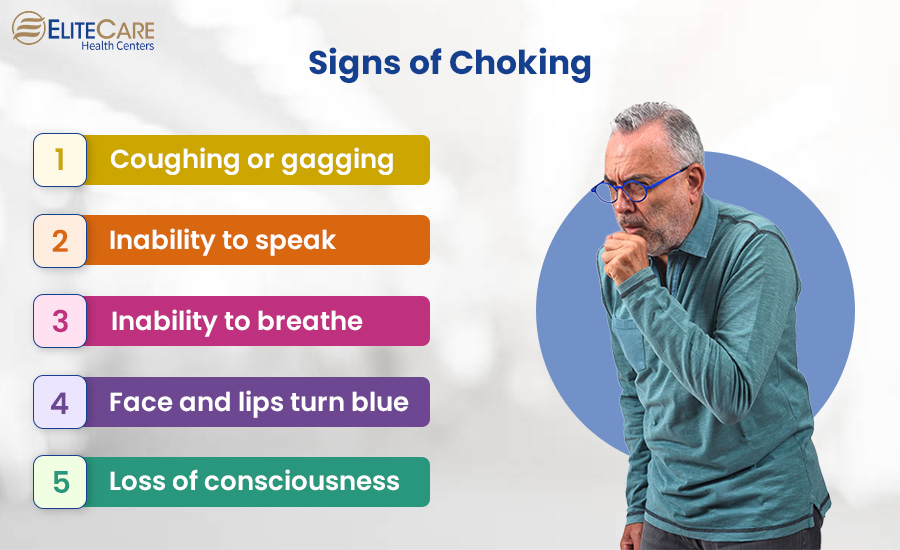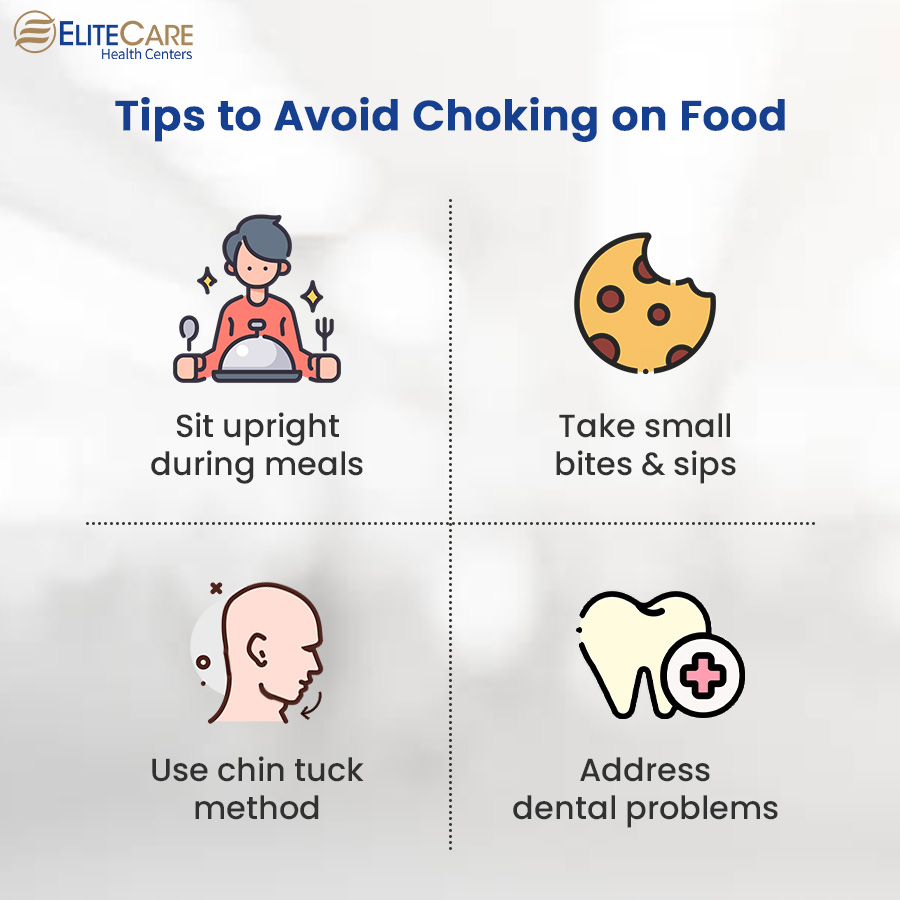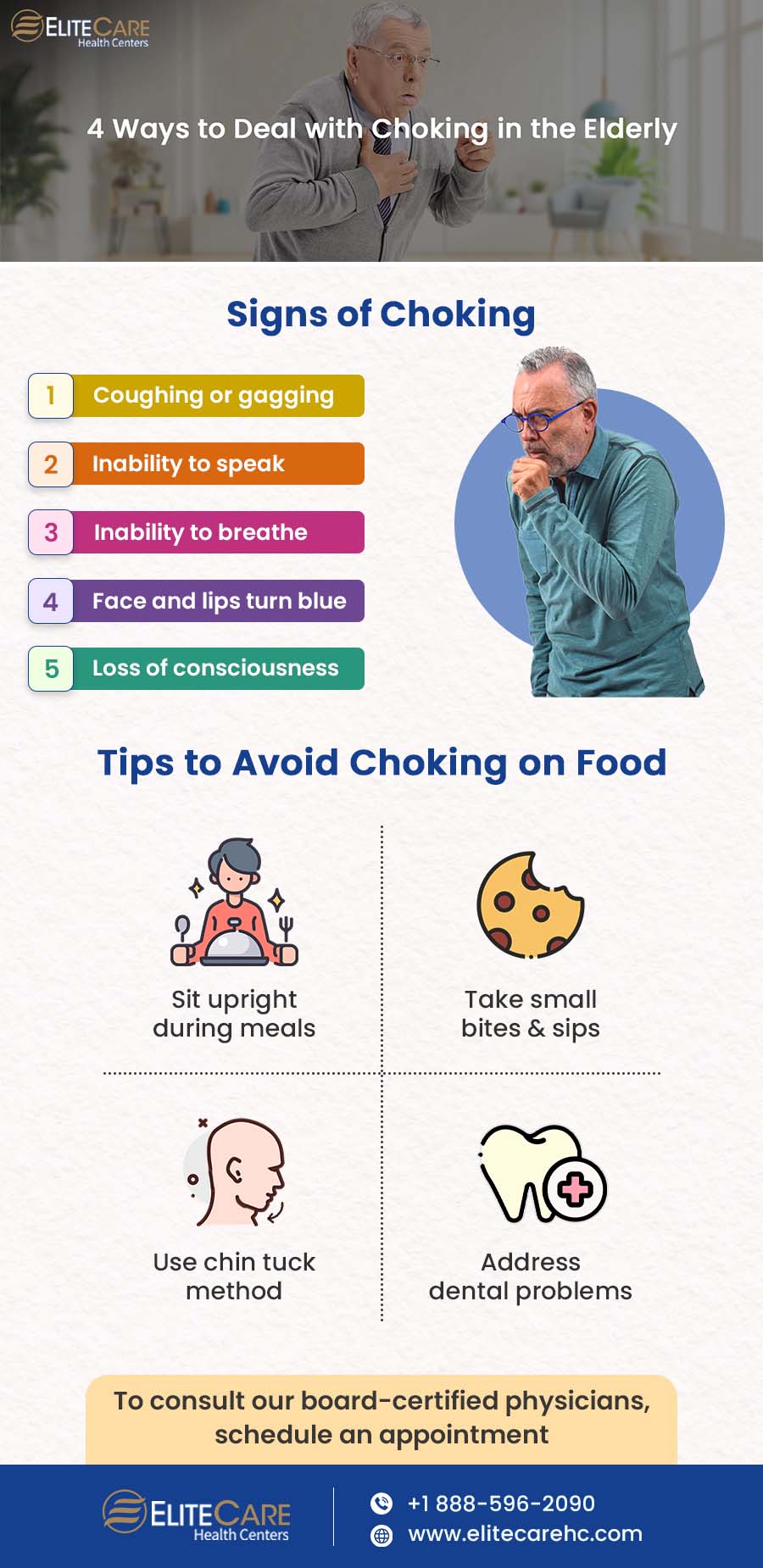
In the United States, seniors over the age of 65 are seven times more likely to choke on food than children between the age of one to four years. Secondary to falls, choking is a leading cause of preventable death in the elderly. Older adults are prone to choking on food or water during meals; this is because ageing naturally weakens the muscles in the mouth and throat which increases the risk of choking.
Signs of Choking:

When food or water obstructs the airway in the throat or windpipe, these are the signs that follow:
- Coughing or gagging
- Inability to speak
- Inability to breathe
- Face and lips turn blue
- Loss of consciousness
Oftentimes, when seniors are choking, they will be able to ask for help through non-verbal cues. It is important to keep an eye out for gestures or signs that may indicate that they are choking.
If a senior is unable to cough while they are choking, giving them 5 firm back blows with a flat palm may help clear the blockage. If not, the Heimlich manoeuvre or abdominal thrusts (watch this video for a demonstration) must be administered promptly. If that doesn’t dislodge the obstruction either, call 911 and continue alternating between 5 back blows and 5 abdominal thrusts.
Read More: List of Common Health Problems in Elderly
What Causes Choking in the Elderly?
Sarcopenia
Sarcopenia refers to the loss of skeletal muscle mass and is associated with ageing. While sarcopenia usually affects the muscles that are used for walking or gripping things, it can also affect the muscles that are used for eating and swallowing. Sarcopenia is associated with reduced tongue strength which can affect swallowing and cause choking in the elderly.
Poor-Fitting Dentures
The risk of choking significantly increases in the elderly who have very few teeth left or poorly fitting dentures. Seniors without molars experience pain when chewing tough foods like toast and meat. And seniors with poorly fitted dentures may also struggle with inflamed gums and bleeding. The pain associated with eating can severely discourage aged people from chewing foods before swallowing. While saliva can help break down smaller food particles, larger bites of food that are not adequately chewed can get stuck in the throat and cause choking.
Eating Dry Foods
Dry and hard fibrous foods like nuts, raw carrots, meat and toasted bread require rotary or circular chewing movement. Older adults may not be able to chew tough foods well due to tooth loss or poorly fitting dentures. They may also lack the stamina to chew each morsel sufficiently before swallowing. Hastily swallowing meat or bread before it is properly chewed can lead to choking.
Read More: Can Certain Food Improve Your Brain Health?
Fatigue During Meals
Repetitive chewing and swallowing are an essential part of eating. But for older adults suffering from fatigue, this process can be physically exhausting. Seniors that are chronically fatigued don’t chew food enough in a bid to finish meals quickly. Inadequately chewed food can significantly increase the risk of choking in the elderly.
Medication
Medications like beta blockers, muscle relaxants, diuretics and antidepressants are often prescribed to older adults to help manage pre-existing health conditions. These medicines can cause a dry mouth and can affect the degree to which the food can be broken down while chewing. In the absence of sufficient saliva, even soft foods can cause choking in seniors. Moreover, dry mouth is associated with dental problems like gum disease and tooth decay – which in turn could negatively affect the way seniors chew and eat their food.
Tips to Avoid Choking on Food

Here are some tips to reduce the risk of choking during meals:
- Sit Upright During Meals: Sitting upright in a chair during and twenty minutes after the meal can significantly reduce the risk of choking. Studies also show that eating while sitting in a chair can improve appetite and reduce the risk of aspiration in older adults.
- Small Bites & Small Sips: Eating small bites of food can make chewing easier and prevent seniors from choking. One can use smaller spoons during meals as they help control bite size. Additionally, sipping as opposed to gulping water can prevent the risk of aspiration in the elderly.
- Chin Tuck Method: Tucking the chin to the chest while swallowing helps narrow the airway which in turn reduces the risk of food entering the windpipe.
- Address Dental Problems: Tooth loss and poorly fitting dentures can result in inflammation which causes immense pain and discomfort in the elderly. If left untreated, they will create sore spots in the mouth which will affect seniors’ ability to chew and swallow properly.
Conclusion
Choking during meals is a common age-related problem that senior citizens often struggle with. If left uncorrected, it could potentially lead to drastic weight loss and malnourishment as seniors may reduce eating altogether.
Choking can also expose older adults to conditions like aspiration pneumonia which could permanently scar lung tissues and cause deadly infections. Moreover, choking on a large bite of food that obstructs the airway can cut off the oxygen supply to the brain which may then lead to irreversible brain damage or even death. It is important, therefore, to address any problems associated with chewing or swallowing as soon as possible.
If your elderly loved one needs guidance on managing age-related dysphagia and choking, visit the nearest EliteCare Health Centers, one of the best medical clinics in Florida for senior care services. Visit this website to schedule an appointment with our board-certified primary care physicians today!






